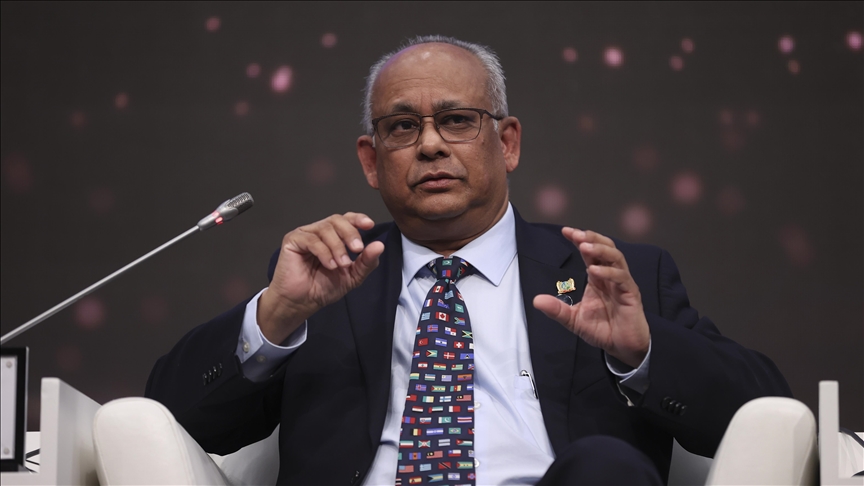Organization of American States elects Ramdin, marking break from Trump era
Caribbean leader's victory seen as rebuke to US policies in Latin America

BOGOTA, Colombia
Albert Ramdin of Suriname was elected the secretary-general of the Organization of American States (OAS) on March 10, marking a significant departure from the organization's recent direction and signaling a potential reshaping of inter-American relations.
But Ramdin was not initially considered the most likely candidate to win.
Pro-Trump candidate fails to win support
Paraguay's candidate, current Foreign Minister Ruben Ramirez Lezcano, had entered the OAS secretary-general race as the perceived frontrunner, seemingly positioned to secure the leadership.
The US' Donald Trump administration actively campaigned for Ramirez Lezcano, utilizing diplomatic pressure to garner support. However, Trump's endorsement ultimately became a detriment to Lezcano's campaign.
A coalition comprising Caribbean nations and progressive South American governments, including Colombia, Chile, Uruguay, and Brazil, who were wary of Trump's policies, united in support of Ramdin. Ultimately, Lezcano stepped down and 28 of the 32 voting countries expressed their support for Ramdin.
Experts suggest that the election served as a referendum on the US administration's approach to Latin America.
Camilo Manuel Gonzalez, an International Relations professor at Javeriana University in Colombia, posits that Trump’s imposition of tariffs, his threats to assert control over the Panama Canal, and a general disregard for regional concerns collectively galvanized Latin America in its defiance.
“When Donald Trump initiated his tariff policy, launched attacks on certain Latin American governments, and raised the highly contentious issue of the Panama Canal, Ramirez Lezcano's prospects began to diminish,” Gonzalez stated.
Trump has maintained that his government would seek to claim control over the Panama Canal for economic reasons and due to its alleged operation by China, claims that Panamanian President Jose Raul Mulino has disputed.
His stances on immigration have also led to friction with the Colombian and Brazilian governments.
The new OAS leader
This election marks the first time a representative from the Caribbean has held this position. Ramdin will succeed Uruguayan Luis Almagro as the head of the OAS, who has presided over the organization since 2015. He is scheduled to assume his new role on May 26, with a term extending until 2030.
Ramdin has served as Suriname's top diplomat since 2020 and previously held the position of OAS assistant secretary general for two consecutive terms, from 2005 to 2015.
Experts characterize his leadership style as favoring quiet diplomacy and note his reputation as a consensus builder.
“Ramdin has a long history of working within the organization and possesses a thorough understanding of its daily operations," Gonzalez observed. “He will likely prioritize finding consensus among member states.”
According to Gonzalez, Ramdin's approach is to avoid actions that could potentially undermine the confidence of governments. This means that the OAS, under his leadership, will likely reflect the preferences of the member states that elected him, potentially limiting intervention in countries' internal affairs.
Divisions under Almagro
Ramdin’s election presents a stark contrast to the outgoing OAS director, Luis Almagro, who is known for his confrontational rhetoric.
Upon assuming the role of the OAS chief, Almagro prioritized the situation in Venezuela and the ongoing crisis within the country on his agenda.
He has consistently asserted that political intimidation is prevalent in Venezuela and has addressed issues such as violence, poverty, corruption, and accusations of drug trafficking leveled against the South American nation's government.
Almagro has even formally requested the arrest of Venezuela's President Nicolas Maduro before the International Criminal Court following the deaths of a dozen individuals during protests that occurred after the National Electoral Council declared Maduro the winner of the July 28, 2024 elections.
The country has announced its intention to withdraw from the OAS and has accused Almagro of seeking "foreign intervention," and currently has no representative at the Washington-based organization.
“This reflects the weakness of the organization because it has not been able to generate credible and binding results,” says Gonzalez.
Ramdin has already articulated his intention to pursue agreements and solutions to the hemisphere's challenges from a position of intermediary, a stance that clearly distinguishes him from Almagro.
In a speech delivered to the OAS General Assembly in Washington in March, Ramdin called for regional unity and dialogue among member states.
"Let us unite and mobilize our collective capabilities," he urged. "I hope you will join me on this path, to move forward, not backward, united, not divided."
Multilateralism under Trump
The Trump administration's pronounced skepticism toward multilateralism presents a significant potential threat to the financial stability of the OAS.
Trump's "America First" doctrine can be interpreted as a disdain for international organizations perceived as not directly serving the national interests of the US.
This perspective raises concerns that the administration might significantly reduce or even terminate US funding to the OAS, which has historically been a substantial contributor.
“It is quite plausible that Trump will announce his intention to cut funding to the OAS,” Gonzalez speculated. “However, if Ramdin and the Latin American states present a united front against Trump, he might reconsider, as has occurred in past tariff disputes.”
OAS under new leadership
Gonzalez suggests that under Ramdin's new leadership, the OAS is anticipated to address pressing regional issues, including immigration. Another key priority for the organization under Ramdin is expected to be the cultivation of stronger diplomatic and economic ties between Latin American states and other global blocs, such as the EU, as well as major players like China and other nations.
“This strategic outreach aims to diversify partnerships and potentially create a counterbalance to the unilateral pressures and policies of Trump,” he says.
Anadolu Agency website contains only a portion of the news stories offered to subscribers in the AA News Broadcasting System (HAS), and in summarized form. Please contact us for subscription options.


